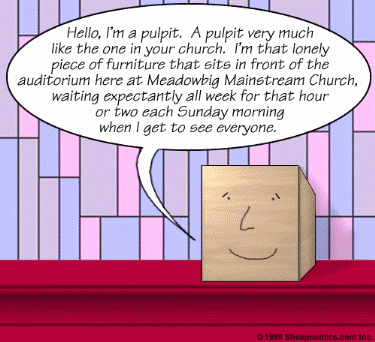

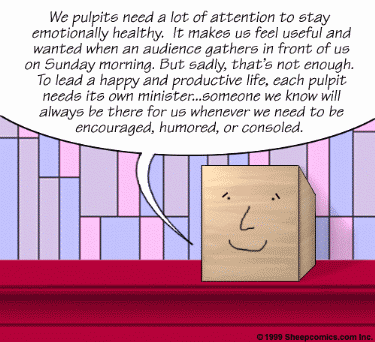
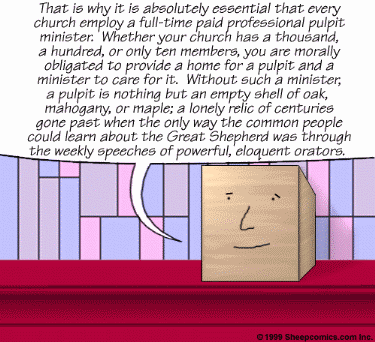

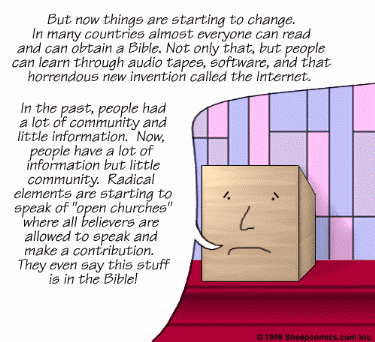
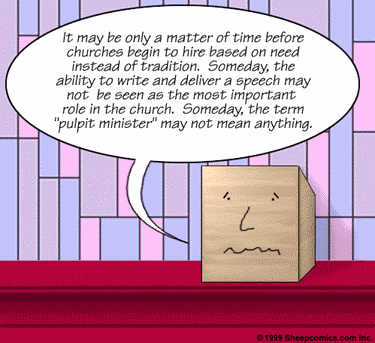

Editorial Notes
Before I begin my editorial for this episode, I want to state a disclaimer. This editorial is not about pulpit ministers, itís about the term "pulpit minister" and our modern obsession with public speaking. Iím sure that there are many very godly people who now have or have had the job title "pulpit minister". I did not write this editorial to question the commitment or sincerity of any such individuals. This editorial and comic strip is about the system, not about individuals.
About ten years ago a former employer sent me through a nationally known course in public speaking. This course consisted of eight three-hour classes meeting one evening per week. A public speaking performance was expected of each participant, every week. Every class session was at once terrifying, funny, and touching. Over the course of these eight weeks I saw myself, and about thirty others, turn from a group of stage frightened strangers into an emotionally bonded band of competent public speakers. At the end of the course, many of us were sad to say goodbye.
My employer send me to this class to help me succeed in my career, and I am grateful to this day for the experience. To get to the top in business, it is very helpful to develop oratory skills. This way you can become a featured speaker at seminars, banquets, and conferences. By enhancing your visibility among your peers, you enhance your prestige and career prospects. Of course, itís also fun for we who are not quite "at the top" to go to these seminars, banquets, and conferences.
In the secular world, public speaking ability is one of many skills that are valued. But in mainstream American Christianity, elocution seems to reign supreme as the skill valued above all others. I can think of two places in the New Testament (Rom 12:4-8 and 1 Cor 12) where Paul lists the various gifts that function in the church. Today, if I were to write a "gift list" based on my observations, I would write "first there are public speakers, then there is everyone else".
Here is a true story. Several years ago I was single and involved in a small church where there were very few unattached members of the opposite sex. I decided I wanted to get married, and that I wanted to marry a Christian. I knew of a Christian singles group that met on Friday evenings at a certain house in the city where I lived. I drove across town to the right house at the right time only to find out that the meeting had been canceled.
Why was it canceled? It turned out that the "professional" who was going to give the speech was unable to attend, so the meeting was called off. I had driven across town for nothing, but on my way home I had time to think. What did this say about this group of Christians? Apparently it was assumed that there was no profit or purpose in this group assembling together unless some special individual could deliver a pre-written speech. What a sad commentary.
Public speaking (an uninterrupted one-to-many monologue) is one of the primary ways information is transmitted in our culture. Itís the way our candidates for political leadership present themselves to us. Much of our time in school is spent listening quietly while one person makes an extended verbal presentation of information. I would not expect Christianity to function in such a culture without public speaking occurring from time to time.
I do believe, however, that mainstream Christianityís reliance and glorification of this particular means of communication has gotten way out of hand. Sunday morning just isnít right unless one (and only one) person delivers a pre-written speech (I define a "sermon" as a speech dealing with Christianity). And, if you want to get people from several different churches together for a workshop, retreat, or seminar, you must fly in a celebrity speaker from some other part of the country to make the whole event seem legitimate. I may be exaggerating a bit, but thatís the way it seems to be.
One would think that Christianity would simply cease to function in our culture if not for itís army of professional orators. The leadership role in most every church is defined as the person who gives the prepared speech every Sunday morning. Then there is the even more elite caste of speaker-celebrities who spend much of their time flying around the country, speaking at the workshops, retreats, and seminars. If you canít get paid to speak, you have nothing to say, ever.
We all know there were some great speeches in the New Testament: Peterís address on the Day of Pentecost (Acts 2), Stephenís address to those who were to stone him (Acts 7), Paulís address to the Greeks in the Areopagus in Athens (Acts 17). Not to mention Jesusí "sermon on the mount." (Matthew 5 through 7)
I can definitely find some great speeches in the New Testament, but what I canít find is the New Testament church relying on oratory performances by elite individuals to legitimize itís assemblies. Paul described the meeting of the church in Corinth as follows: "What is the outcome then, brethren? When you assemble, each one has a psalm, has a teaching, has a revelation, has a tongue, has an interpretation. Let all things be done for edification." (1 Cor 14:26) Paul did not say "When you assemble, make sure that only one has a teaching, and make sure itís the same person every week forever."
If I were a visitor to the church in Corinth, it wouldnít take more than a few of these meetings to learn something about, and from, everyone. In a way, it sounds like the public speaking class I described above. Today, after two thousand years of progress, I can attend a church with hundreds of people for years and learn about, and from, just one person.
So, we went from "each one" contributing per week, to only one contributing per week. From this we went to the same person contributing every week, and that roll of "lone contributor" became a profession. Finally we named the profession after a piece of furniture, and the position of "pulpit minister" was born. Then came a dependence on that position to legitimize our assemblies or our church as a whole. (That wasnít a summary of church history, just a way to show how far we are from Paulís description of the assemblies in Corinth.)
On my desk in front of me I have a Christian newspaper published for members of a certain group of churches, a group that emphasizes "restored" New Testament Christianity. In the back pages there are many adds placed by churches seeking a "pulpit minister".
Now, you might correctly say that there is much more to the "pulpit minister" job than just preaching on Sunday morning. It is ironic to me, however, to see how many of these adds ask for both a resume and an audio tape. Itís almost as if theyíre auditioning performers. Does the winner get a recording contract?
Paul described himself in 2 Cor 10:10, ĎFor some say, "His letters are weighty and forceful, but in person he is unimpressive and his speaking amounts to nothing.í I wonder if the Apostle Paul could get a job as a "pulpit minister" today.